
In Greco-Roman mythology, Aeneas was a Trojan hero, the son of the Trojan prince Anchises and the Greek goddess Aphrodite. His father was a first cousin of King Priam of Troy, making Aeneas a second cousin to Priam's children. He is a minor character in Greek mythology and is mentioned in Homer's Iliad. Aeneas receives full treatment in Roman mythology, most extensively in Virgil's Aeneid, where he is cast as an ancestor of Romulus and Remus. He became the first true hero of Rome. Snorri Sturluson identifies him with the Norse god Víðarr of the Æsir.
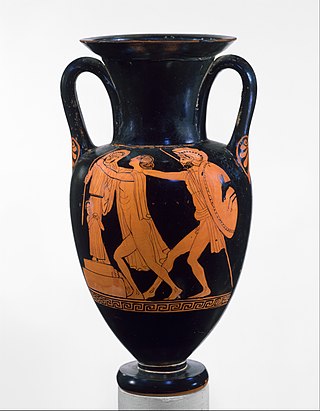
Cassandra or Kassandra in Greek mythology was a Trojan priestess dedicated to the god Apollo and fated by him to utter true prophecies but never to be believed. In modern usage her name is employed as a rhetorical device to indicate a person whose accurate prophecies, generally of impending disaster, are not believed.

Laocoön is a figure in Greek and Roman mythology and the Epic Cycle. Laocoön is a Trojan priest. He and his two young sons are attacked by giant serpents, sent by the gods when Laocoön argued against bringing the Trojan horse into the city. The story of Laocoön has been the subject of numerous artists, both in ancient and in more contemporary times.

Publius Vergilius Maro, usually called Virgil or Vergil in English, was an ancient Roman poet of the Augustan period. He composed three of the most famous poems in Latin literature: the Eclogues, the Georgics, and the epic Aeneid. A number of minor poems, collected in the Appendix Vergiliana, were attributed to him in ancient times, but modern scholars consider his authorship of these poems to be dubious.
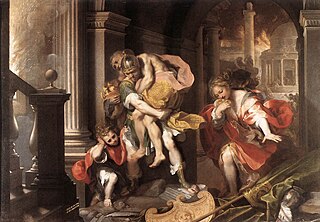
The Aeneid is a Latin epic poem that tells the legendary story of Aeneas, a Trojan who fled the fall of Troy and travelled to Italy, where he became the ancestor of the Romans. Written by the Roman poet Virgil between 29 and 19 BC, the Aeneid comprises 9,896 lines in dactylic hexameter. The first six of the poem's twelve books tell the story of Aeneas' wanderings from Troy to Italy, and the poem's second half tells of the Trojans' ultimately victorious war upon the Latins, under whose name Aeneas and his Trojan followers are destined to be subsumed.

In Greek mythology, the Trojan Horse was a wooden horse said to have been used by the Greeks during the Trojan War to enter the city of Troy and win the war. The Trojan Horse is not mentioned in Homer's Iliad, with the poem ending before the war is concluded, and it is only briefly mentioned in the Odyssey. But in the Aeneid by Virgil, after a fruitless 10-year siege, the Greeks constructed a huge wooden horse at the behest of Odysseus, and hid a select force of men inside, including Odysseus himself. The Greeks pretended to sail away, and the Trojans pulled the horse into their city as a victory trophy. That night, the Greek force crept out of the horse and opened the gates for the rest of the Greek army, which had sailed back under the cover of darkness. The Greeks entered and destroyed the city, ending the war.

In Greek and Roman mythology, a harpy is a half-human and half-bird, often believed to be a personification of storm winds. They feature in Homeric poems.
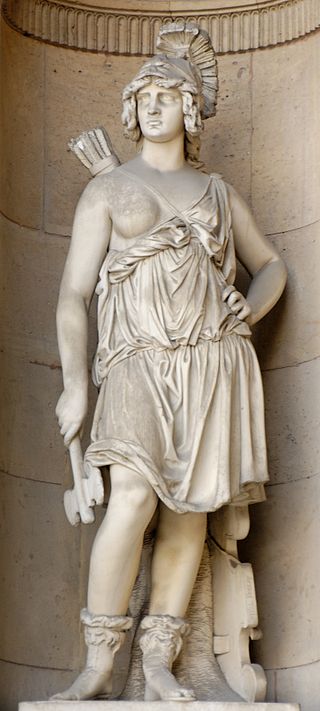
Penthesilea was an Amazonian queen in Greek mythology, the daughter of Ares and Otrera and the sister of Hippolyta, Antiope, and Melanippe. She assisted Troy in the Trojan War, during which she was killed by Achilles or Neoptolemus. The asteroid 271 Penthesilea, discovered in 1887, was named in her honor.

In the Aeneid of Virgil, Achaemenides was a son of Adamastos of Ithaca, and one of Ulysses's crew. He was marooned on Sicily when Ulysses fled the Cyclops Polyphemus, until Aeneas arrived and took him to Italy with his company of refugee Trojans.
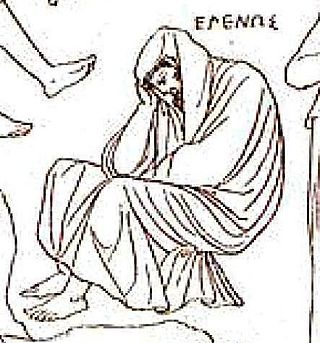
In Greek mythology, Helenus was a gentle and clever seer. He was also a Trojan prince as the son of King Priam and Queen Hecuba of Troy, and the twin brother of the prophetess Cassandra. He was also called Scamandrios, and was a lover of Apollo.
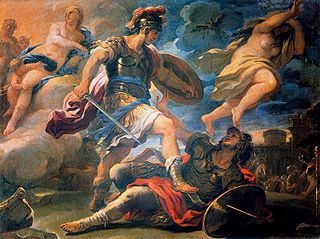
Turnus was the legendary King of the Rutuli in Roman history, and the chief antagonist of the hero Aeneas in Virgil's Aeneid.
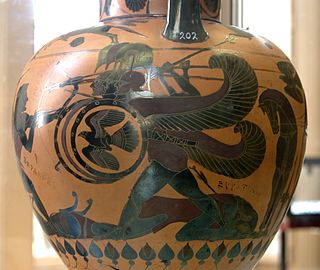
In Vergil's Aeneid, Erulus is a king of Praeneste. At birth, he was given three souls (animae) by his mother, the goddess Feronia, who also tripled his ability to defend himself by giving him three sets of arms.

In Virgil's Aeneid, Camilla of the Volsci is the daughter of King Metabus and Casmilla.
In Greek mythology, Antenor was a counselor to King Priam of Troy during the events of the Trojan War.

In Greek and Roman mythology, Nisus and Euryalus are a pair of friends serving under Aeneas in the Aeneid, the Augustan epic by Virgil. Their foray among the enemy, narrated in book nine, demonstrates their stealth and prowess as warriors, but ends as a tragedy: the loot Euryalus acquires attracts attention, and the two die together. Virgil presents their deaths as a loss of admirable loyalty and valor. They also appear in Book 5, during the funeral games of Anchises, where Virgil takes note of their amor pius, a love that exhibits the pietas that is Aeneas's own distinguishing virtue.
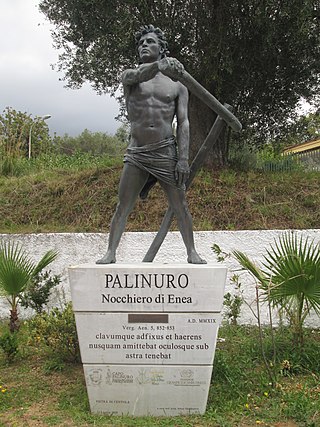
Palinurus (Palinūrus), in Roman mythology and especially Virgil's Aeneid, is the coxswain of Aeneas' ship. Later authors used him as a general type of navigator or guide. Palinurus is an example of human sacrifice; his life is the price for the Trojans landing in Italy.
Nicholas Mark Horsfall was a British scholar of Latin literature. Educated at Peterhouse, Cambridge, and Corpus Christi College, Oxford, he worked as a lecturer at University College London, but retired in 1987. He was a specialist on the works of the Roman poet Vergil and published five commentaries (2000–2013) on individual books of his Aeneid. This series of commentaries was described by the Latinist James O'Hara as "one of the most remarkably productive and rich periods of publication of any modern classicist".
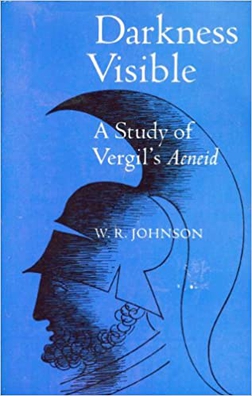
Darkness Visible: A Study of Vergil's Aeneid is an academic monograph by the American Latinist W. R. Johnson. Published in 1976 by University of California Press, the book presents an interpretation of the Aeneid, an epic by the Roman poet Vergil. Claiming to abandon previously dominant historical-political reading, Johnson argues that the poem is at its heart concerned with the darkness of the human condition.

Corynaeus is the name of one or more characters in Virgil's Aeneid (29–19 BCE). The first mention of Corynaeus in the poem is as a Trojan follower of Aeneas, who performs funerary rites for Misenus. Characters of the same name are then specified both as being killed by an archer, and later fighting in the final battle. This apparent contradiction is often explained by defining them as two separate characters.
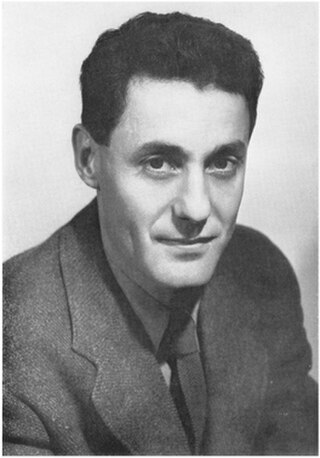
Adam Milman Parry was an American classical scholar. He worked on Greek and Latin history literature, particularly the works of Thucydides, Homer and Virgil, and was a founding figure of the scholarly movement that became known as the Harvard School of criticism into Virgil's Aeneid.